初二英语下册知识点
- 格式:doc
- 大小:74.00 KB
- 文档页数:15
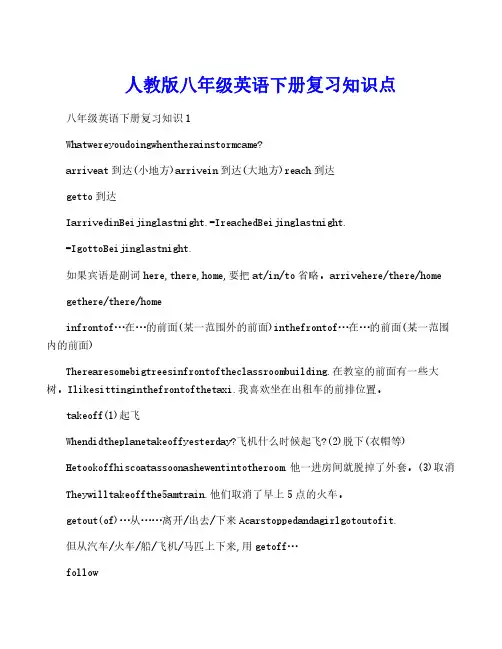
人教版八年级英语下册复习知识点八年级英语下册复习知识1Whatwereyoudoingwhentherainstormcame?arriveat到达(小地方)arrivein到达(大地方)reach到达getto到达IarrivedinBeijinglastnight.=IreachedBeijinglastnight.=IgottoBeijinglastnight.如果宾语是副词here,there,home,要把at/in/to省略。
arrivehere/there/homegethere/there/homeinfrontof…在…的前面(某一范围外的前面)inthefrontof…在…的前面(某一范围内的前面)Therearesomebigtreesinfrontoftheclassroombuilding.在教室的前面有一些大树。
Ilikesittinginthefrontofthetaxi.我喜欢坐在出租车的前排位置。
takeoff(1)起飞Whendidtheplanetakeoffyesterday?飞机什么时候起飞?(2)脱下(衣帽等)Hetookoffhiscoatassoonashewentintotheroom.他一进房间就脱掉了外套。
(3)取消Theywilltakeoffthe5amtrain.他们取消了早上5点的火车。
getout(of)…从……离开/出去/下来Acarstoppedandagirlgotoutofit.但从汽车/火车/船/飞机/马匹上下来,用getoff…follow跟随Ifollowedhimuphehill.我跟着他上了山.沿着……前进Followthisroaduntilyougettothepostoffice.顺着这条路一直到邮局.(3)听懂,理解Couldyouspeakmoreslowly?Ican’tfollowyou.你能说慢点吗?我听不(4)followsb.todosth.跟着某人做某事Pleasefollowmetoreadthestory.请跟我读这个。
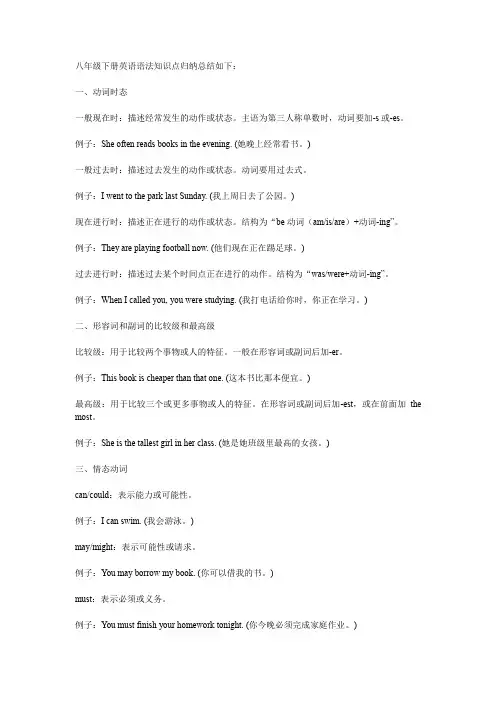
八年级下册英语语法知识点归纳总结如下:一、动词时态一般现在时:描述经常发生的动作或状态。
主语为第三人称单数时,动词要加-s或-es。
例子:She often reads books in the evening. (她晚上经常看书。
)一般过去时:描述过去发生的动作或状态。
动词要用过去式。
例子:I went to the park last Sunday. (我上周日去了公园。
)现在进行时:描述正在进行的动作或状态。
结构为“be动词(am/is/are)+动词-ing”。
例子:They are playing football now. (他们现在正在踢足球。
)过去进行时:描述过去某个时间点正在进行的动作。
结构为“was/were+动词-ing”。
例子:When I called you, you were studying. (我打电话给你时,你正在学习。
)二、形容词和副词的比较级和最高级比较级:用于比较两个事物或人的特征。
一般在形容词或副词后加-er。
例子:This book is cheaper than that one. (这本书比那本便宜。
)最高级:用于比较三个或更多事物或人的特征。
在形容词或副词后加-est,或在前面加the most。
例子:She is the tallest girl in her class. (她是她班级里最高的女孩。
)三、情态动词can/could:表示能力或可能性。
例子:I can swim. (我会游泳。
)may/might:表示可能性或请求。
例子:You may borrow my book. (你可以借我的书。
)must:表示必须或义务。
例子:You must finish your homework tonight. (你今晚必须完成家庭作业。
)四、被动语态被动语态用于描述事物的状态或描述被动发生的动作。
结构为“be动词(am/is/are/was/were)+动词的过去分词”。
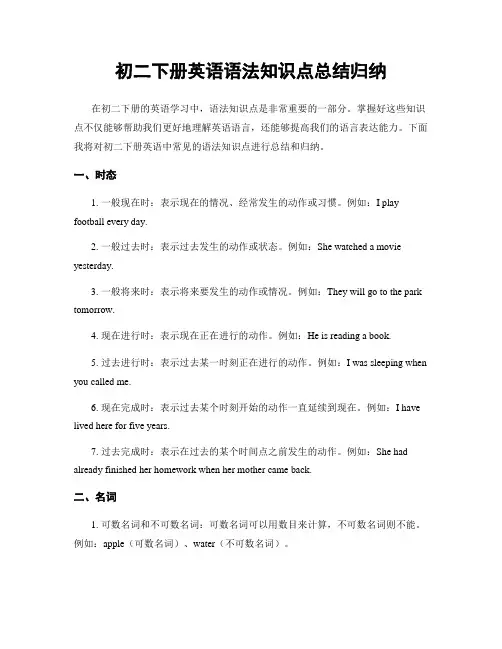
初二下册英语语法知识点总结归纳在初二下册的英语学习中,语法知识点是非常重要的一部分。
掌握好这些知识点不仅能够帮助我们更好地理解英语语言,还能够提高我们的语言表达能力。
下面我将对初二下册英语中常见的语法知识点进行总结和归纳。
一、时态1. 一般现在时:表示现在的情况、经常发生的动作或习惯。
例如:I play football every day.2. 一般过去时:表示过去发生的动作或状态。
例如:She watched a movie yesterday.3. 一般将来时:表示将来要发生的动作或情况。
例如:They will go to the park tomorrow.4. 现在进行时:表示现在正在进行的动作。
例如:He is reading a book.5. 过去进行时:表示过去某一时刻正在进行的动作。
例如:I was sleeping when you called me.6. 现在完成时:表示过去某个时刻开始的动作一直延续到现在。
例如:I have lived here for five years.7. 过去完成时:表示在过去的某个时间点之前发生的动作。
例如:She had already finished her homework when her mother came back.二、名词1. 可数名词和不可数名词:可数名词可以用数目来计算,不可数名词则不能。
例如:apple(可数名词)、water(不可数名词)。
2. 单数名词和复数名词:单数名词表示一个,复数名词表示多个。
例如:cat (单数名词)、cats(复数名词)。
3. 物主代词:my, your, his, her, its, our, their。
例如:This is my book.三、形容词和副词1. 形容词:修饰名词,描述事物的特征。
例如:a beautiful flower。
2. 副词:修饰动词、形容词或其他副词,表示时间、地点、方式等。
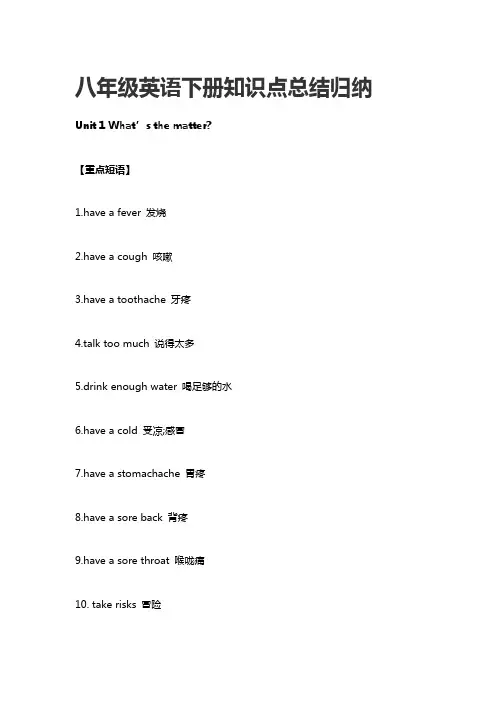
八年级英语下册知识点总结归纳Unit 1 What’s the matter?【重点短语】1.have a fever 发烧2.have a cough 咳嗽3.have a toothache 牙疼4.talk too much 说得太多5.drink enough water 喝足够的水6.have a cold 受凉;感冒7.have a stomachache 胃疼8.have a sore back 背疼9.have a sore throat 喉咙痛10. take risks 冒险11.hot tea with honey 加蜂蜜的热茶12.see a dentist 看牙医13.get an X-ray 拍X 光片14.take one’s temperature 量体温15.put some medicine on sth. 在……上面敷药16. give up 放弃17. sound like 听起来像18. all weekend 整个周末19. in the same way 以同样的方式20. go to a doctor 看医生21. go along 沿着……走22. on the side of the road 在马路边23. shout for help 大声呼救24. without thinking twice 没有多想25. get off 下车26. have a heart problem 有心脏病27. to one’s surprise 另某人惊讶的是28. thanks to 多亏了;由于29. in time 及时30. make a decision 做出决定31. get into trouble 造成麻烦32. right away 立刻;马上33. because of 由于34. get out of 离开;从……出来35. keep on doing sth. 继续或坚持做某事36. put a bandage on sth. 用绷带包扎37. fall down 摔倒38. feel sick 感到恶心39. have a nosebleed 流鼻血40. cut his knee 割伤他的膝盖41. put her head back 把她的头向后仰42. have problems breathing 呼吸困难43. mountain climbing 登山运动44. be used to doing sth. 习惯做某事45. run out (of) 用完;用尽46. so that 以便47. so...that... 如此……以至于...…48. be in control of 掌管;管理49. in a difficult situation 在闲境中【重点句型】1. What's the matter with you?= What'the trouble with you?= What's wrong with you? 你怎么了?2. What should she do? 她该怎么办呢?3.Should I take my temperature? 我应该量一下体温吗?4.You should lie down and rest. 你应该躺下休息一会儿。
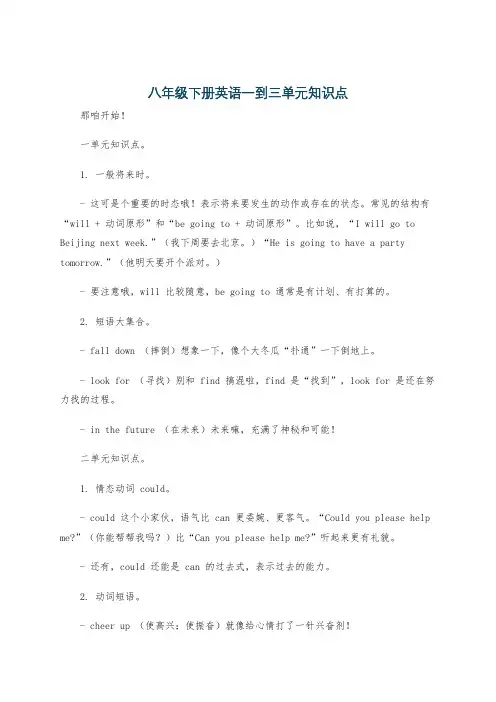
八年级下册英语一到三单元知识点那咱开始!一单元知识点。
1. 一般将来时。
- 这可是个重要的时态哦!表示将来要发生的动作或存在的状态。
常见的结构有“will + 动词原形”和“be going to + 动词原形”。
比如说,“I will go to Beijing next week.”(我下周要去北京。
)“He is going to have a party tomorrow.”(他明天要开个派对。
)- 要注意哦,will 比较随意,be going to 通常是有计划、有打算的。
2. 短语大集合。
- fall down (摔倒)想象一下,像个大冬瓜“扑通”一下倒地上。
- look for (寻找)别和 find 搞混啦,find 是“找到”,look for 是还在努力找的过程。
- in the future (在未来)未来嘛,充满了神秘和可能!二单元知识点。
1. 情态动词 could。
- could 这个小家伙,语气比 can 更委婉、更客气。
“Could you please help me?”(你能帮帮我吗?)比“Can you please help me?”听起来更有礼貌。
- 还有,could 还能是 can 的过去式,表示过去的能力。
2. 动词短语。
- cheer up (使高兴;使振奋)就像给心情打了一针兴奋剂!- give out (分发;散发)把东西一个一个发出去。
- come up with (想出;提出)脑袋里突然蹦出个好主意。
3. 感叹句。
- What + (a/an) + 形容词 + 名词 + (主语 + 谓语)!“What a beautiful flower!”(多美的花啊!)- How + 形容词/副词 + (主语 + 谓语)!像“How fast he runs!”(他跑得多快啊!)1. 过去进行时。
- 这是在讲过去某个时刻正在进行的动作。
结构是“was/were + 动词的现在分词”。
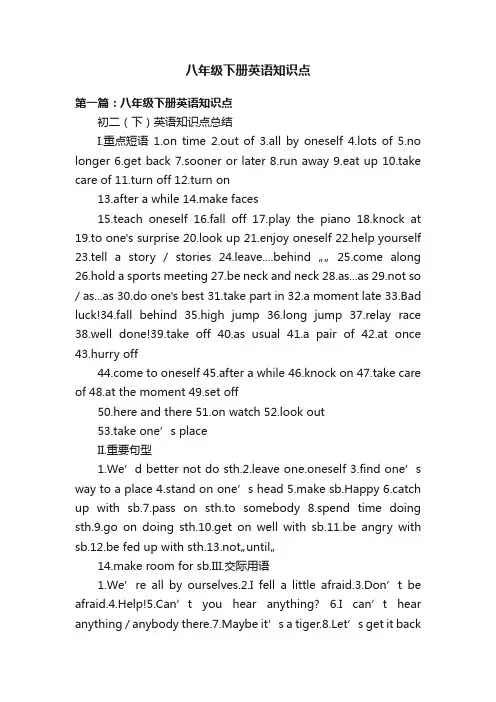
八年级下册英语知识点第一篇:八年级下册英语知识点初二(下)英语知识点总结I.重点短语1.on time 2.out of 3.all by oneself 4.lots of 5.no longer 6.get back 7.sooner or later 8.run away 9.eat up 10.take care of 11.turn off 12.turn on13.after a while 14.make faces15.teach oneself 16.fall off 17.play the piano 18.knock at 19.to one's surprise 20.look up 21.enjoy oneself 22.help yourself 23.tell a story / stories 24.leave....behind …… e along 26.hold a sports meeting 27.be neck and neck 28.as...as 29.not so / as...as 30.do one's best 31.take part in 32.a moment late 33.Bad luck!34.fall behind 35.high jump 36.long jump 37.relay race 38.well done!39.take off 40.as usual 41.a pair of 42.at once43.hurry offe to oneself 45.after a while 46.knock on 47.take care of 48.at the moment 49.set off50.here and there 51.on watch 52.look out53.take one’s placeII.重要句型1.We’d better not do sth.2.leave one.oneself3.find one’s way to a place4.stand on one’s head5.make sb.Happy6.catch up with sb.7.pass on sth.to somebody8.spend time doing sth.9.go on doing sth.10.get on well with sb.11.be angry with sb.12.be fed up with sth.13.not…until…14.make room for sb.III.交际用语1.We’re all by ourselves.2.I fell a little afraid.3.Don’t be afraid.4.Help!5.Can’t you hear anything?6.I can’t hear anything / anybody there.7.Maybe it’s a tiger.8.Let’s get it bac kbefore they eat the food.9.Did she learn all by herself? 10.Could she swim when she was …years old? 11.She didn’t hurt herself.12.He couldn’t buy himself many nice things.13.Did he enjoy himself? 14.Help yourselves.15.Bad luck!e on!17.Well done!Con gratulations(to…)!18.It must be very interesting.19.I don’t think you’ll like it.20.It seems to be an interesting book.21.I’m sure(that)… I’m not sure if… I’m not sure what to… 22.I hope so.23.What was he/she drawing when…?24.I’m sorry to trouble you.25.Would you please…? 26.What were you doing at ten o’clock yesterday morning? 27.You look tired today.28.You’d better go to bed early tonight, if you can.29.How kind!30.Let’s move the bag, or it may cause an accident.31.It’s really nice of you.32.Don’t mentio n it.33.Don’t crowd around him.IV.重要语法1.不定代词/副词的运用;2.反身代词的用法;3.并列句;4.形容词和副词的比较等级;5.冠词的用法;6.动词的过去进行时;【名师讲解】 1.bring/takeBring表示“带来、拿来”,指从别处朝说话人所在或将在的地方“带来、拿来”。
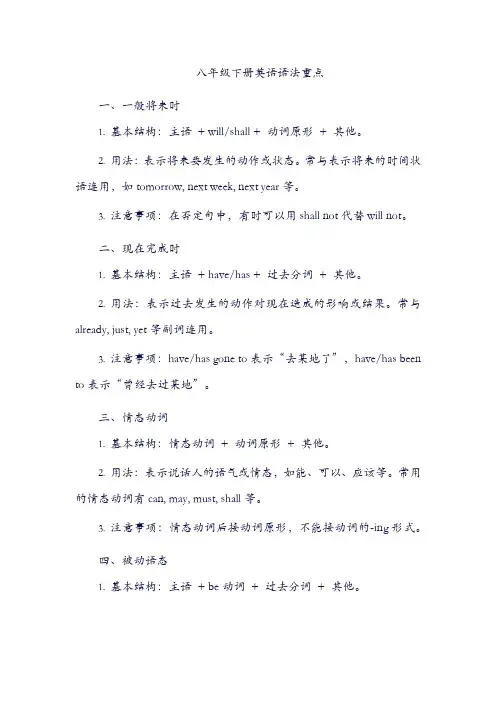
八年级下册英语语法重点一、一般将来时1.基本结构:主语+ will/shall + 动词原形+ 其他。
2.用法:表示将来要发生的动作或状态。
常与表示将来的时间状语连用,如tomorrow, next week, next year等。
3.注意事项:在否定句中,有时可以用shall not代替will not。
二、现在完成时1.基本结构:主语+ have/has + 过去分词+ 其他。
2.用法:表示过去发生的动作对现在造成的影响或结果。
常与already, just, yet等副词连用。
3.注意事项:have/has gone to表示“去某地了”,have/has been to表示“曾经去过某地”。
三、情态动词1.基本结构:情态动词+ 动词原形+ 其他。
2.用法:表示说话人的语气或情态,如能、可以、应该等。
常用的情态动词有can, may, must, shall等。
3.注意事项:情态动词后接动词原形,不能接动词的-ing形式。
四、被动语态1.基本结构:主语+ be动词+ 过去分词+ 其他。
2.用法:表示主语是动作的接受者。
常与by引导的方式状语连用,如by machine, by air等。
3.注意事项:被动语态的时态变化主要通过be动词的变化来实现,不同时态的被动语态需要注意与该时态的主动语态相对应。
五、不定代词和冠词用法1.不定代词:表示泛指或不确定的代词,如some, any, other等。
some用于肯定句,any用于否定句或疑问句;other表示“其他的”。
2.冠词:表示特指或泛指的词,分为定冠词the和不定冠词a/an。
a用于辅音音素开头的单词前,an用于元音音素开头的单词前;the 表示特指或上文提到的某个名词。
3.用法:不定代词和冠词一起使用时,可以构成限定词短语,如some books, the school gate等。
限定词短语可以修饰名词,表示特指或泛指的概念。
4.注意事项:在英语中,不定代词和冠词的使用是有规则和限制的,需要根据上下文和语境来判断使用哪个代词或冠词。
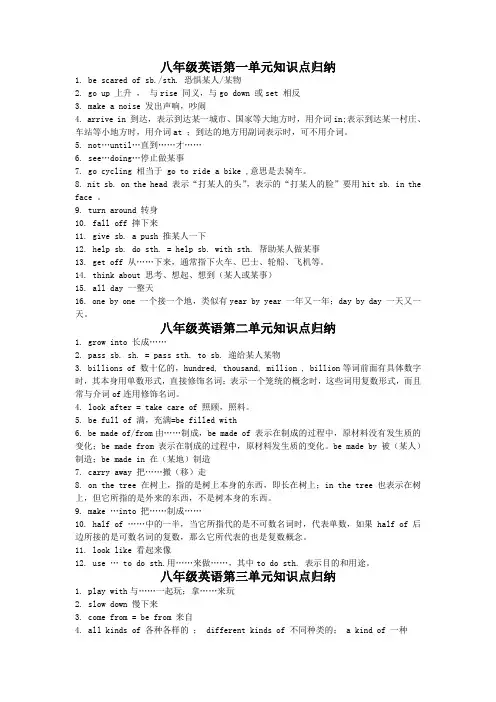
八年级英语第一单元知识点归纳1. be scared of sb./sth. 恐惧某人/某物2. go up 上升,与rise 同义,与go down 或set 相反3. make a noise 发出声响,吵闹4. arrive in 到达,表示到达某一城市、国家等大地方时,用介词in;表示到达某一村庄、车站等小地方时,用介词at ;到达的地方用副词表示时,可不用介词。
5. not…until…直到……才……6. see…doing…停止做某事7. go cycling 相当于 go to ride a bike ,意思是去骑车。
8. nit sb. on the head 表示“打某人的头”,表示的“打某人的脸”要用hit sb. in the face 。
9. turn around 转身10. fall off 摔下来11. give sb. a push 推某人一下12. help sb. do sth. = help sb. with sth. 帮助某人做某事13. get off 从……下来,通常指下火车、巴士、轮船、飞机等。
14. think about 思考、想起、想到(某人或某事)15. all day 一整天16. one by one 一个接一个地,类似有year by year 一年又一年;day by day 一天又一天。
八年级英语第二单元知识点归纳1. grow into 长成……2. pass sb. sh. = pass sth. to sb. 递给某人某物3. billions of 数十亿的,hundred, thousand, million , billion等词前面有具体数字时,其本身用单数形式,直接修饰名词;表示一个笼统的概念时,这些词用复数形式,而且常与介词of连用修饰名词。
4. look after = take care of 照顾,照料。
5. be full of 满,充满=be filled with6. be made of/from由……制成,be made of 表示在制成的过程中,原材料没有发生质的变化;be made from 表示在制成的过程中,原材料发生质的变化。
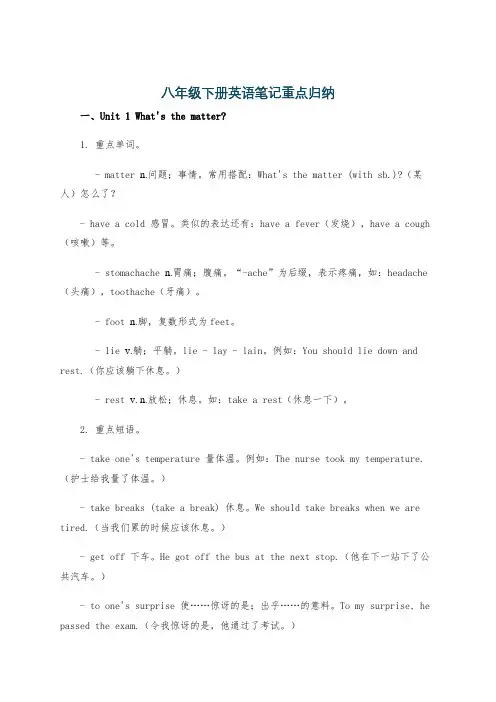
八年级下册英语笔记重点归纳一、Unit 1 What's the matter?1. 重点单词。
- matter n.问题;事情。
常用搭配:What's the matter (with sb.)?(某人)怎么了?- have a cold 感冒。
类似的表达还有:have a fever(发烧),have a cough (咳嗽)等。
- stomachache n.胃痛;腹痛。
“-ache”为后缀,表示疼痛,如:headache (头痛),toothache(牙痛)。
- foot n.脚,复数形式为feet。
- lie v.躺;平躺。
lie - lay - lain。
例如:You should lie down and rest.(你应该躺下休息。
)- rest v. n.放松;休息。
如:take a rest(休息一下)。
2. 重点短语。
- take one's temperature 量体温。
例如:The nurse took my temperature.(护士给我量了体温。
)- take breaks (take a break) 休息。
We should take breaks when we are tired.(当我们累的时候应该休息。
)- get off 下车。
He got off the bus at the next stop.(他在下一站下了公共汽车。
)- to one's surprise 使……惊讶的是;出乎……的意料。
To my surprise, he passed the exam.(令我惊讶的是,他通过了考试。
)- What should I do? 我应该做什么?用于询问建议。
- You should see a dentist and get an X - ray. 你应该去看牙医并且拍个X 光片。
should为情态动词,后接动词原形,表示建议。
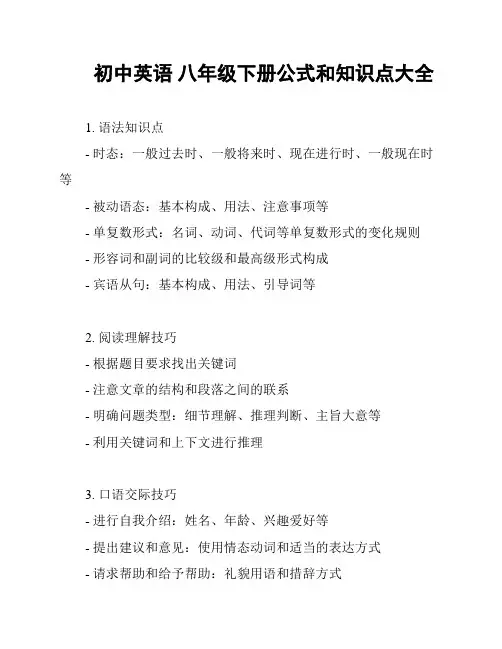
初中英语八年级下册公式和知识点大全
1. 语法知识点
- 时态:一般过去时、一般将来时、现在进行时、一般现在时等
- 被动语态:基本构成、用法、注意事项等
- 单复数形式:名词、动词、代词等单复数形式的变化规则
- 形容词和副词的比较级和最高级形式构成
- 宾语从句:基本构成、用法、引导词等
2. 阅读理解技巧
- 根据题目要求找出关键词
- 注意文章的结构和段落之间的联系
- 明确问题类型:细节理解、推理判断、主旨大意等
- 利用关键词和上下文进行推理
3. 口语交际技巧
- 进行自我介绍:姓名、年龄、兴趣爱好等
- 提出建议和意见:使用情态动词和适当的表达方式
- 请求帮助和给予帮助:礼貌用语和措辞方式
- 发表观点和表达同意或不同意:使用连接词和适当的表达方式
4. 写作技巧
- 书信写作:格式、常用句式、常见话题等
- 日记写作:格式、时态、人称等
- 描写人物和事物:使用形容词、副词和比喻句等手法
- 写作连贯与逻辑:使用恰当过渡词和连接词
5. 听力技巧
- 注意关键词和信息的捕捉
- 练听懂不同语速和口音的英语
- 预测答案和选项:根据上下文和常识进行推测
- 多听多练:提高听力技能的有效方法
以上是初中英语八年级下册的公式和知识点大全,希望对你的研究有所帮助。
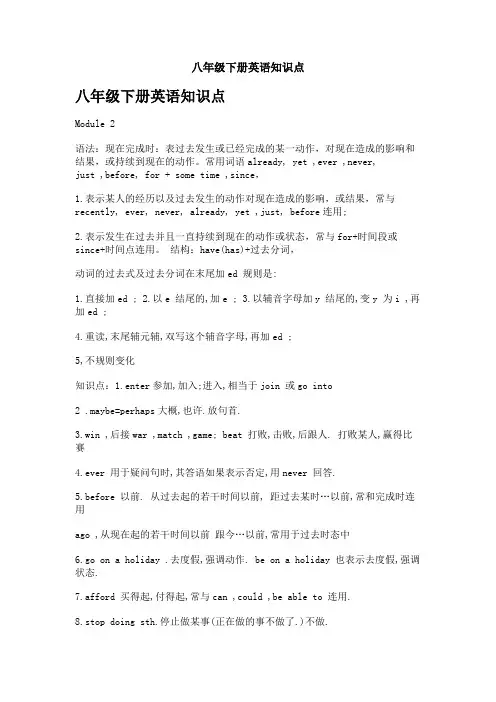
八年级下册英语知识点八年级下册英语知识点Module 2语法:现在完成时:表过去发生或已经完成的某一动作,对现在造成的影响和结果,或持续到现在的动作。
常用词语already, yet ,ever ,never,just ,before, for + some time ,since,1.表示某人的经历以及过去发生的动作对现在造成的影响,或结果,常与recently, ever, never, already, yet ,just, before连用;2.表示发生在过去并且一直持续到现在的动作或状态,常与for+时间段或since+时间点连用。
结构:have(has)+过去分词,动词的过去式及过去分词在末尾加ed 规则是:1.直接加ed ;2.以e 结尾的,加e ;3.以辅音字母加y 结尾的,变y 为i ,再加ed ;4.重读,末尾辅元辅,双写这个辅音字母,再加ed ;5,不规则变化知识点:1.enter参加,加入;进入,相当于join 或go into2 .maybe=perhaps大概,也许.放句首.3.win ,后接war ,match ,game; beat 打败,击败,后跟人. 打败某人,赢得比赛4.ever 用于疑问句时,其答语如果表示否定,用never 回答.5.before 以前. 从过去起的若干时间以前, 距过去某时…以前,常和完成时连用ago ,从现在起的若干时间以前跟今…以前,常用于过去时态中6.go on a holiday .去度假,强调动作. be on a holiday 也表示去度假,强调状态.7.afford 买得起,付得起,常与can ,could ,be able to 连用.8.stop doing sth.停止做某事(正在做的事不做了.)不做.stop to do sth .停下来(正在做的事)去做某事(另一件事)要做9.what a pity /That’s a pity .多遗憾啊.10.think of 想起,起出,认为 think about 思考,考虑两者区别:1)当表示”想起,想出”时,两者可以互换 2)当think of 表示”认为”时, 不能用think about3)当think about 表示”思考,研究”时,不能用think of .11. thanks for = thank you for+名词或动词ing 因……而感谢你 Thank you for helping me.13.invite sb. to do sth.邀请某人做某事 invite sb. to someplace邀请某人去某地.14.at the moment 此刻,现在,常与一般现在时或现在进行时连用.at that moment 在那时,常与一般过去时连用.15.one of +形容词最高级+名词复数,最…的之一,动词用三单形式.16.send sth .to do sth =send sb. sth 把某物寄给某人.17. 5. the + 姓氏s :……一家人,……夫妇 ,18. 1)have been to some place 去过某地(已回) ,后接once ,twice ,three ,times等表次数的词(短语)也可与just ,never ,ever ,连用,但不能与时间连用2) have gone to 到某地去了,(去了未回).3)have been in 已经在某地待了多长时间,常与一段时间连用.19.on ,in at 时间表达的用法:on 用于具休的某一天,及对早中晚进行了修饰后也用on ;in 用于年月季节,一段时间,以及单独的早中晚,如:in the morning ,in the afternoon ,in the evening ,at用于具体的时刻,几点,及一些固定搭配.20.ancient ,古老的,古代的, 反义词:modern ,现在的,当代的21.be different from ,与… 不同, 其反义:the same as .与…一样.22. find it +形容词to do sth.发现做某事是……的.23.mix up 混淆,拌和,调和 mix with 和…..混合24.ask sb. to do sth .要求某人做某事 ask sb. not to do sth .要求某人不做某事25.ask sb. about sth .询问某人关于某事 ask sb. for sth .向某人要某物ask for help 寻求帮助 26.count down 倒数,倒计时27.sth happened to sb .某人发生了某事. sb. happen to do sth .碰巧做某事28.all over the world 遍及世界 29.around the world 整个世界30.the rest of one’s life 某人的余生. 31.good luck好运八年级下册英语知识点大全Module 3.1.no problem 没问题2.the lastest news 最新的消息3.in order to 为了4.search for 寻找,搜索5.hunderds of 成百的6. a small part of 一小部分7.none ,既可指人,又可指物,用于三者或三者以上,常用于回答以how many /how much ,none of 没有一个,no one 只指人.不与of 连用.用于回答who 开头的问句.7. 8.take a photo of =take photos of =take pictures of =take a pictures9.so,与such的用法:1)当修饰可数名词单数时,用”such+a/an+形容词+名词.”或”so +形容词+a/an+名词.”2)当这些可数名词或不可数名词前有many ,much ,few ,little(表示少)修饰时,则用so .如:so many people ,so much money10.in space 在太空中, in the sky 在天空中.e back 回来 12.look for 寻找13.as ..as 像..一样 14.decide to do sth .决定做某事15.be named after以.. 名字命名 16.take after与…相像.17.be up to 正在做某事,忙于做某事 What are you up to ?=What are you doing ?18.be up to sb. 由..决定,由…负责19.yet 副词,还,尚,用于否定和疑问句句末;already ,已经,常用于肯定句中或句末.20.That’s why,这就是..的原因 ,后接结果.That’s because ,后接原因21.on the news 在新闻上 22.on a newspaper 表示(某物)在报纸上23.in a newspaper在报纸里(的内容).24.discover指发现原来已有但不为人知的事物;invent ,发明,即创造出前所未有的东西find out 查出真相,原理等 ,也可用于查看地时刻表等 ;find ,找到,发现,指寻找的结果look for 寻找 ,侧重指寻找的动作和过程.25.the noon 月亮,the +世界上独一无二的事物名词. 26,in order to 为了,表示目的,27.message ,口头传递的或书写的消息,可数名词, news ,通过新闻媒体发布的消息,不可数, information,指在阅读,谈话中特别关注的消息,情报,资料等,不可数.28.hundred,thousand,million,billion只有和of 一起时,才加s,跟了数字,不加s.30.none代词,没有一个,没有一人,一点儿也没有.通常用于三者或三者以上,既可指人也可指物,可与of 连用,可回答how many ; no one 只能指人,不能与of 连用.,可回答who .31.三到达:get to =arrive in (大地方)/at (小地方)=reach 跟地点副词时不用介词,不用reach32.take a photo of sb. 给某人照相,而且是给他本人照相;take a photo for 为某人照相,不一定有他本人. 33.enough 修饰名词放在前,修饰形容词和副词放在后.34.alone作表语,独自一方,个体单独 lonely作表语或定语,心里孤单,寂寞.municate with sb. 和某人交流话题写作:随着时代的进步、科技的发展,人们的生活发生了日新月异的变化。
八年级英语下册知识总结归纳知识才是力量,只有知识能使我们诚实地爱人,尊重人的劳动,由衷地赞赏无间断的伟大劳动的美好成果;只有知识才能使我们成为具有坚强精神的、诚实的、有理性的人。
下面小编给大家分享一些八年级英语下册知识总结归纳,希望能够帮助大家,欢迎阅读!八年级英语下册知识总结1I’ve had this bike for three years.【重点单词】yard [jɑ:d] n. 院子yard sale 庭院拍卖会sweet [swi:t] adj. & n. 甜的,糖果memory [?mem?r?] n. 记忆,记忆力,回忆cent [sent] n. 分,分币toy [t?i] n. 玩具bear [b??] n. 熊maker [?me?k?(r)] n. 生产者,制造者bread maker 面包机scarf [skɑ:f] n. 围巾,披巾,头巾soft [s?ft] adj. 柔软的soft toy 软体玩具,布绒玩具check [t?ek] n. & v. 餐馆账单;检查check out 察看,观察board [b?:d] n. 板子,甲板board game 棋类游戏junior [?d?u:n??(r)] adj. 地位低下的junior high school 初中clear [kl??] adj. 清晰的,清澈的clear out 清理,清除掉bedroom [?bedru:m] n. 卧室no longer 不再,不复own [?un] adj. 属于自己的railway [?re?lwe?] n. 铁路,铁道part [pɑ:t] n. 部分,零部件part with 放弃,交出certain [?s?:tn] adj. 某一,确定的,无疑的as for 至于,关于honest [??n?st] adj. 诚实的,正直的to be honest 说实在的while [wail] conj. & n. 当...时候,一段时间,一会儿truthful [?tru:θfl] adj. 诚实的,真实的hometown [?h??mta?n] n. 家乡,故乡nowadays [?na??de?z] adv. 现今,现在,目前search [s?:t?] v. 搜索,搜查among [??m??] prep. 在…中间;在…之中crayon ['kre??n] n. 彩色铅笔shame [?e?m] n. 羞耻regard [r?'ɡɑ:d] n. & v. 致敬,问候;将…视为count [kaunt] n. & v. 计算,计数;有价值century ['sent??r?] n. 世纪,百年according [?'k?:d??] adv. 依照,按照opposite [??p?zit] prep. & adj. 在…对面,与…相对;对面的especially [??spe??li] adv. 特别,尤其childhood [?t?a?ldh?d] n. 孩童时期consider [k?n?sid?] v. 仔细考虑,思考,注视,close to 几乎,接近hold [h?uld] v. 拥有,抓住【重点短语】1. these days 目前,现在2.regard with great interest 以极大的兴趣关注着3. in order to 为了4.so far 迄今,到目前为止5. in need 需要6. not...any more 不再.....7. welcome to sp 欢迎来到.....8.check out 察看,观察9. board games 棋类游戏10. one last thing 最后一样东西11. junior high school 初级中学12.clear out 清理13. no longer 不再14.toy monkey 玩具猴15. part with 与.....分开16. to be honest 说实在的17. ride a bike 骑自行车18. have a yard sale 进行庭院拍卖会19. one’s old things 某人的旧东西20. bring back sweet memories 勾起甜美的回忆21. give away 捐赠22. play for a while 玩一会23. do with 处理,处置24. search for work 找工作25.for the last 13 years 在过去的13年里26. the mid-20th century 20世纪中期27. stay the same 保持原状28. according to 依照,按照29. in one’s opinion 依......看30. in my time 在我那个年代【重点句型】1. Have long have you had that bike over there? 那边的那辆自行车你买了多久了?2. Amy has had her favorite book for three years . 艾米拥有她最喜欢的书3年了。
初二下学期英语知识点总结真正的知识分子该有一副傲骨,不善趋炎附势。
这使他们当中绝大多数显得个色,总是鹤立鸡群,混不进人堆里。
下面小编给大家分享一些初二下学期英语知识点,希望能够帮助大家,欢迎阅读!初二下学期英语知识点11. 短语动词小结常见动词短语结构有下面几种:(1)动词+副词如:give up 放弃;turn off 关掉;stay up 熬夜这种结构有时相当于及物动词,如果其宾语是代词,就必须放在动词和副词之间,如果是名词,则既可插在动词和副词之间,也可放在短语动词后。
(2)动词+介词如:listen of 听;look at 看;belong to 属于这种结构相当于及物动词,后面跟宾语。
(3)动词+副词+介词如:come up with 提出,想出; run out of 用完,耗尽(4)动词+名词+介词如:take part in参加;catch hold of 抓住2. each 每个,各自的,强调事物的个别情况,常与of 连用every 每个,每一个的,一切的,有“全体”的意思不能与of 连用3. help sb. (to) do 帮助某人做某事 help him (to) studyhelp sb. with sth. 帮助某人做某事 help him with Englishhelp do 帮助做某事 help study4. spend...doing... 花费…做…I spent a day visiting Beijing. 我花了一天的时间去参观北京。
spend… on sth. 花费…在… I spent 3 years on English.5. join 参加 (指参加团体、组织) 如:join the Party 入党take part in 参加 (指参加活动) 如:take part in sports meeting参加运动会6. run out 与 run out of(1)run out (become used up). 其主语往往为物。
八年级英语下册知识点Unit 1 what’s the matter?一、重点短语词组1. have a fever 发烧2. have a cough 咳嗽3. have a toothache 牙疼4. talk too much 说得太多5. drink enough water 喝足够的水6. have a cold 受凉;感冒7. have a stomachache 胃疼8. have a sore back 背疼9. have a sore throat 喉咙痛10. lie down and rest 躺下来休息11. hot tea with honey 加蜂蜜的热茶12. see a dentist 看牙医13. get an X-ray 拍X 光片14. take one’s temperature 量体温15. balanced diet平衡饮食16. go along…沿着……走17. take breaks 休息18. sound like 听起来像19. all weekend 整个周末20. in the same way 以同样的方式21. on the side of the road 在马路边22. shout for help 大声呼救23. without thinking twice 没有多想24. get off 下车get on 上车25. have a heart problem 有心脏病26. to one’s surprise 使.......惊讶的27. thanks to 多亏了;由于28. in time 及时29. save a life 挽救生命30. get into trouble 造成麻烦31. agree to do sth. 同意做什么32. because of 由于33. get out of 离开;从……出去34. hurt oneself 受伤35. put a bandage on sth.用绷带包扎36. fall down 摔倒37. feel sick 感到恶心38. have a nosebleed 流鼻血39. cut his knee 割伤他的膝盖40. put her head down 把她的头低下41. have problems breathing 呼吸困难42. mountain climbing 登山运动43. be used to doing sth. 习惯做某事44. take risks 冒险45. so that 为了46. So… that 如此……以至于…47. be in control of 掌管;管理48. in a difficult situation 在困境中49. keep on doing sth. 继续或坚持做某事 50. make a decision 做出决定51. stay healthy 保持健康=keep healthy=keep in good health=keep fit52. put some medicine on sth. 在…上面敷药二、重点句型1. What’s the matter?你怎么了?= What’s the trouble / problem with you?= What’s wrong with you?2. What should she do? 她该怎么办呢?Should I take my temperature? 我应该量一下体温吗?主语+ should/shouldn’t + 动词原形...①You should lie down and rest. 你应该躺下休息一会儿。
秋新人教版八年级英语下册各知识点归纳总结Unti1 what’s the matter?短语归纳1.too much 太多2.lie down 躺下3.get an X-ray 做个X光检查4.take one ’s temperature 量体温5.put some medicine on ......在....上敷药6.have a fever 发热7.take breaks /take a break 休息8.without thinking twice 没多想9.get off 下车10.take sb to the hospital 送某人去医院11.wait for等待12.to one’s surprise 使.......惊讶旳thanks to多亏于;由于14.in time及时15.think about 考虑16.have a heart problem患有心脏病17.get into the trouble 碰到麻烦18.do the right thing做对旳旳事情事情19.fall down 摔倒20.put ...... on sth把...放在某物上21.get hit/sunburned 摔伤/烧伤22.be interested in 对.....感爱好23.be used to 习惯于.... 24.take risks/take a risk 挑战25.lose one’s life 失去生命26.because of 由于27.run out of 用完28.cut off 切除29.get out of 从...出来30.make a decision/decisions 做决定31.be in control of 掌管;管理32.give up 放弃使用方法归纳1.need to do sth .需要去做某事2.see sb doing sth 看见某人正在做某事3.ask sb sth 问询某人某事4.expect sb to do sth 期望某人做某事5.agree to do sth 想要做某事6.help sb (to) do sth 协助某人做某事7.want to do sth 想要做某事8.tell sb to do sth 告诉某人做某事9.have problems(in) doing sth 做某事有困难e sth to do sth用某物去做某事11.be/get used to doing sth 习惯于做某事12.seem to do sth 仿佛做某事13.keep on doing sth 继续做某事14.mind doing sth 介意做某事语法点1.问询某人旳健康问题及碰到麻烦旳体现措施2.情态动词should旳使用方法情态动词should旳使用方法表达劝说与提议,也表义务与责任第一人称问句中,征询提议要记清3.不定代词旳使用方法有关阅读措施推理判断阅读法精细解读1. What’s the matter (wi th you)? 怎么了?出什么事了?What’s the trouble/ the problem / wrong with sb./ sth.?2. I had a cold.我感冒了。
八年级下册英语知识点总结英语是一门广泛使用的语言,在全球范围内都有重要的地位。
作为一名八年级学生,学习英语是非常关键的。
下面将为大家总结八年级下册英语的重点知识点。
一、语法知识1. 直接引语和间接引语:直接引语是直接引用他人的原话,需使用引号标记;间接引语是将他人原话进行转述。
2. 时态:掌握一般现在时、一般过去时、一般将来时、现在进行时、过去进行时、现在完成时的基本用法和区别。
3. 被动语态:了解如何使用被动语态,即将主动语态句子中的主语变为动作的承受者,动词通过be动词词组和过去分词构成。
4. 宾语从句:了解宾语从句的构建规则,即将一个完整的句子作为宾语嵌入到主句中。
5. 并列连词:掌握如and、but、or等并列连词的使用,能够使用它们连接句子和短语。
二、词汇知识1. 同义词和反义词:学会辨别和使用同义词和反义词,能够丰富写作和口语中的表达。
2. 前缀和后缀:了解常见的前缀和后缀,可以通过改变单词的结构和含义,扩展词汇量。
3. 习惯用语和短语:学会使用一些习惯用语和短语,能够让你的英语更加地道和流利。
4. 近义词和辨析:掌握一些近义词和辨析词,能够在写作和阅读中正确使用它们。
三、句子结构和写作技巧1. 各种从句:了解各种从句的构建规则,如定语从句、主语从句、表语从句和状语从句,能够在写作中使用。
2. 书信写作:学会书写不同类型的书信,包括邀请信、道歉信、建议信等,了解书信的格式和常用句式。
3. 描述和说明:学会使用一些常用的描述性和说明性的句式,可以更清晰地表达自己的观点和观察。
四、阅读理解技巧1. 主旨大意题:通过阅读文段,掌握提取主旨和大意的技巧,能够准确回答相关问题。
2. 细节理解题:学会寻找文段中的细节,能够迅速找到相关信息并回答问题。
3. 推理判断题:理解文段的背景和内容,能够根据已有信息进行推理和判断。
4. 根据上下文猜测词义:通过上下文的提示和线索,能够猜测单词或短语的意义。
初二下册英语语法知识点总结归纳英语语法作为学习英语的重要组成部分,在初二下册学习中占据了重要地位。
在本文中,我们将对初二下册英语语法知识点进行总结归纳,以帮助同学们更好地掌握和应用这些知识。
一、动词时态1. 一般现在时:表示经常性或普遍性的动作或状态。
常与副词always, usually, often等连用。
2. 现在进行时:表示正在进行的动作。
常与副词now, at the moment 等连用。
3. 一般过去时:表示过去某个时间发生或存在的动作或状态。
4. 过去进行时:表示过去某一时刻正在进行的动作。
5. 一般将来时:表示将要发生的动作或存在的状态。
6. 未来进行时:表示将来某一时刻正在进行的动作。
7. 现在完成时:表示已经完成的动作对现在造成的影响或结果。
8. 过去完成时:表示在过去某个时间之前已经完成的动作或状态。
二、限定词1. 定冠词:the。
用于特定的人或事物前,或在表达顺序、习惯等特定用法时使用。
2. 不定冠词:a, an。
用于泛指某一类人或事物时使用。
3. 0冠词:不用于特指或泛指的情况下,直接使用名词。
4. 指示代词:this, that, these, those。
用于指示特定的人或事物。
5. 物主代词:my, your, his, her, its, our, their。
表示所属关系。
三、形容词和副词的比较级和最高级1. 一般形容词和副词的比较级和最高级:在一般情况下,形容词和副词的比较级在词尾加er,最高级在词尾加est。
2. 以e结尾的形容词和副词:在比较级和最高级前加r或st。
3. 以辅音字母+y结尾的形容词和副词:变y为i,再加er或est。
4. 双写结尾字母的形容词和副词:在比较级和最高级前双写结尾字母,再加er或est。
四、名词性从句1. 主语从句:由what, who, which, whether等引导的从句,在句子中作主语。
2. 宾语从句:由that, if, whether等引导的从句,在句子中作宾语。
1. 否定句型1) 一般否定句I don't know this. No news is good news.There is no person (smoke)/not a person/not any person (smoke) in the house.2)特指否定He went to his office, not to see him.I am sorry for not coming on time.I don't think/believe/suppose/feel/imagine you are right.3)部分否定All the answers are not right//All is not gold that glittersI don't know all of them.//I can't see everybody/everything.Both of them are not right.4)全体否定None of my friends smoke.//I can see nothing/nobody.Neither of them is right.//Nothing can be so simple as this.5) 延续否定You didn't see him, neither/nor did I.You don't know, I don't know either.He doesn't know English, let alone/to say nothing of/not to speak of (更不用说) French.6) 半否定句We seldom/hardly/scarcely/barely hear such fine singing.I know little English. I saw few people.7) 双重否定You can't make something out of nothing.//What's done cannot be undone. There is no sweet without sweat.//No gain without pains.I can't help /keep/ laughing whenever I hear it.No man is so old but (that) he can learn.8)排除否定Everyone is ready except you.//He did nothing but play.But for your help, I couldn't do it.9)加强否定I won't do it at all.//I can't see it any more.//He is no longer a boy.2. 判断句型1) 一般判断句It is important for us to learn English.It is kind of you to help me sincere means honest.The boy is called/named Tom.We regarded/consider it as an honor.2)强调判断It is English that we should learn.//It is he who helped me a lot.3)弱式判断Your sentence doesn't sound/look/appear/feel right.You look/seem as if/as thought you had been there before.Maybe/Perhaps/ she is ill.He is probably ill.//He is likely ill. //It is possible that he is late4) 注释判断He can remember so many English words, that is (to say) he is a living dictionary.(活字典)5) 正反判断That sounds all right, but in fact it is not.6) 比较判断1It is more a picture than a poem.7) 互斥判断He or you are wrong. Either he is right or I am.3. 祝愿祁使句式1) 一般句式Study hard and keep fit. Be brave! Don't be shy! Get out of here.2)强语式Do tell me. Never tell a lie.3) 委婉祈使句Please tell me the true. Would/Will/Won't do me a favor?Would/Do you mind my smoking? What/How/ about going on foot?4)建议祈使句Let us go. Let us know the time. Don't let the fire out.Let's not waste the time. You'd better start early.Shall we listen to some music? Why don't you get something to drink? Suppose/supposing you pick me up at about six?I suggest we (should) take the train.5)祝愿句Success to you! //Wish you a good journey.May you have a happy marriage. //Here's to your success!Allow me to propose a toast to our friendship!4. 感叹句型How well he speaks! //How kind she is! //What a nice weather it is! Here he comes! //Such is life! //Wonderful! // Help!5. 疑问句型1) 一般疑问句Is he a doctor?//Do you the way to the station?2)反意疑问句He is a teacher, isn't he?//It is quite cheap, don't you think?3) 特殊疑问句What is the distance/width/size/population/temperature/fare?Who is he? What is he?(干什么的)//What is he like? // How is he?How do you like him? //What do you think of him?What ever do you mean by saying this?4)选择疑问句He is a doctor or a nurse?5)间接疑问句Do you know how old he is? //Tell me if (whether) you like it.What do you think/say/suppose I should do?6. 数词句型1) 表数目It is exactly ten o'clock.//It is five miles away from here.He is more than/over/ at least not less than 20.He is under/at most/no more than 20.2)表年月日He was born on April 22 1994/in 1994 on the morning of Oct.1.3)表年龄He is 20 years old/years of age.//He is at the age of 10.4)表倍数It is four times that of last years.This is four times as big (again) as that one.This is four times bigger than that one.2The income is double what it was.The output of coal was 200% greater than in 1998.5)表计量It is 10 meters long/wide/high.//It costs me 100 yuan.I spent 10 hours to finish it.//It took me 10 days to finish it.It is worth 100 yuan.7. 关联指代句型1)两项关连I have two books, one is Chinese; the other English.I have five books, one is Chinese; the others English.To say is one thing, but/and/ to do is another.One the one hand, I am your teacher, and on the other hand, I am also you friend.Some like to play football, others are fond of basketball.2)先后顺序First/firstly, I wish good health, second/secondly success in your study, third/thirdly good luck in everything.First stop, then look, finally cross.At first/in the beginning/ he word hard. Later/Afterwards he is not so diligent.3)修饰限制This is the same book as I lost yesterday.This is the same book that I lost yesterday.(同一本书)Don't trust such a man as over praise you.He/One/Those/They who should come failed to appear.A man/A person/The one/Anyone/People who saw her liked her very much. The day/time/moment will come when China is strongest in the world.4) 两项连接He can speak not only English but also French.The book is both interesting and instructive.It is neither cold nor hot.Please either come in or go out.The old worker has experience and knowledge as well.5)加和关系Besides literature, we have grammar and writing.Apart from oxygen, there are some other gases in the air.In addition to "if", there is many other conjunctions that can introduce conditional clauses.I must go now, incidentally, if you want that book.You seem to like tea, so do I.8. 比较句型1)等比句He is as tall as I. // He is the same height as I.She is no less diligent than he. The lab is no better than a cottage.2) 差比句I speak English worse than he does.//He is not so/as tall as I am.Our knowledge is much inferior to their.3) 极比句He is the tallest of all in the class.None/No one/ is so blind as those that won't see.Nothing is so easy as this.4)比例句The more a man knows, the more he feels his ignorance(无知).35) 择比句He is taller than any other boy in the classIt is better late than never.//They would die than live as slavesHe prefers doing to talking//He prefers to do rather than to talk.He prefers mathematics to English.//I'd rather stay here.6)对比句You think me idle, but on the contrary, I am busy.They are working hard while you are wasting your time.9. 比喻句型We must work like him.//He behaves as his father does.He speaks English as if/though he was a foreigner.10. 条件假设句1) 一般事实If we succeed, what will the people say?Suppose it rains, what shall we do?Persevere(坚持) and you'll succeed.2)虚拟条件句If I were you, I would go.//If you had seen it, you would have been moved. 3)反条件句Unless you try, you'll never succeed.//Don't move, or/else/otherwise I'll shot.4)唯一条件句If only I have another chance, I shall do better.Only in this way can we learn English well.So/As long as we don't lose heart, we'll succeed.5)推论条件句Since that is so, there is no more to say.Now that you are grown up, you must stop this behavior.11. 时间句型1)一般时When I see him, I'll tell him.2) 表同时You'll grow wiser as you grow older.Work while you work, play while you play.He worked, at the same/in the meantime he listened to the music.3)限制时Every/each time when I went to his house, he was out.By the time that we got there, he was out.4)交替时Sometimes he sings, sometimes he dances.At one time the baby cries, at another it talks.5)先时I stopped hem before he began to talk with me.6)后时I'll tell you after I finish it.7)紧接时As soon as I see him, I'll tell him.Once you begin, you must continue.The (very) moment/instant (that) I saw him, I recognized him.On hearing the news, she bust into tears.Hardly had I seen the light, when I heard a loud thundering.8)延续时I haven't seen him since I came here.4A friend is never know till/until a man have need.12. 地点句型1) 一般地点Where have you been?Where there is a will, there is a way.2)方位Hebei lies in the east of China.Japan is lies to the east of China.The house faces (to) the south.He is sitting at the front of the classroomHe is standing in front of/before me.He is sitting at the back of/behind me.He is sitting in the back of/at the rear of the classroom. He is sitting next to/besides me.He is sitting close to/near me.At the top of/On top of the shelf, there are some books. He is sitting on the left/right.The mountain you see to the right is the Purple Mountain.13. 原因句型He didn't go to school because he was ill.Since we are all here, let's begin our meeting.It might rain yesterday, for the ground was wet.Now (that) we have finished the work, we can go home.I am glad to meet you.I am sorry that I hear that.Thank you for your help.That is why he failed to come.He didn't come because of/on account of the weather.He went out of curiosity.I succeeded thanks to his help.This failure is due to the fact they lack experience.Owing to our joint efforts, the task was fulfilled.What are studying English for?For what reason did you choose this?What's the point of asking his to do that?How come you never told me about it?What with the wind and what with the rain, our walk was spoiled.14. 目的句型He stopped aside so that she could go in.He sits in the front in order that he can see words clearly.He gets up early so as to/in order to have time to do exercises.He repeated it for fear that there should be any mistake.15. 结果句型It was very cold, so that the river froze.They cost a lot of money, so/therefore we use them carefully.He is such a good man that every one likes him.He ran so fast that no one could catch him.He hurried to the house only to find that it was empty.I was caught in the rain. As a result, I had a bad cold.16. 程度句型How often do you write to your parents?How long do you stay at home?5It is so beautiful that we all love it.It is too big for you.He is too excited to speak.He is not old enough to know this.The letter must be sent as soon as possibleYou must work as hard as you can.As far as I know, I can speak only English.17. 让步句型Though/Although he is rich, (yet/still) he doesn't show off. Yang as he is, he know a lot of things.Even if/though he succeeded, he was not proud.No matter what you say, I'll still try to do it.Keep calm, whatever happens.In spite of this, we must go ahead with our plans. Regardless of all the difficulties, we'll fight it out to the end.18. 转折句型I searched everywhere but could not find him.You may go, only return quickly.He is seriously ill, still there is hope of his recovery.It looked like rain, however it was clear in the afternoon. He is still young, yet he is high up in the position.He didn't tell me the truth, I know it, though.19. 省略句I think/say/suppose/expect/believe/hope so.Why not come earlier next time?练习一、英汉词组互译1. help sb. to do sth.________________2. be married_____________3. stay up_________________4. at least ______________5. a bit________________6. used to______________7. just now_____________________ 8. look for______________9. look at______________________ 10. put out ______________2.单选1._____does he study English ? Evevy dayA WhenB WhereC How longD How long2.Cathy____to the movies about ones a week.A wentB goC goesD is going3.She likes _________movies.A watchB watchingC watchedD is watching4. It's very nice _____ come and see me.6A.for you toB.of you toC.from you toD.to you of5. I'm interested in animal,so I _____ every Saturday working in an animal hospital.A.payB.getC.takeD.spend6. ____Lucy_____Lily may go to the concert with you.Because they are not allowed to goA.Either;orB.Neither;norC.Both;anD.Not only;but also7. One of his parents is a doctor,( ) works in a school.A.anotherB.otherC.the otherD.the another8. The teacher and writer ____ doing exercise this time yesterday.A.isB.wasC.areD.were9. He gets up early ,_____he can't arrive late for school.A.andB.butC.soD.because10. His mother left him at home _____,he felt ______.A: alone; lonely B: lonely; alone C: alone; alone D loneiy;ionely11. There is only _______ time left .We must hurryA.littleB. a little C fewD.a few12..It _______ her ten years to make money ____the big house .A.takes,to payB.take,pay forC.took,paidD.took,to pay for13. My parents want me ________ at home every night .A.stayB.stayingC.to stayD.staies14. .My friend is angry with me .What should I ______ to him .A.sayB.speakC. argueD.talk15..He could do nothing except _________TV.A.watch Bwatches C.watchingD.will watch16. There's going to ____ a book show next week.A: have B be C do D does17. No one knows why _____ last for school again.A heB he didC did heD he was18. When the teacher _____ a lesson,a strange man came into the classroom.A gaveB givesC givenD was giving19. Tom is one of _____ boys in our classA tallestB tallerC the tallestD the tall720. Which is ______,Li Lei or Wu Tong?A strongB strongestC strongerD the strongest三. 适当形式填空1. Yesterday I______(see)a small child2. ______(watching) TV too much is bad for our eyes3. There are lots of people _______(lie) on the beach .4. They stayed in Shanghai for a few ________(day).5. There are too few ________(tomato) in the fridge.四.句型转换1.I will get up early tomorrow.(改为否定句)2 .I will join the English competition.(改为一般疑问句,并做肯定回答)3. Linda has longer hair than Mary(改为一般疑问句)4. My sister went shopping . She didn`t go to the movies(合并成一句)五.汉英提示完成句子.1.我正在考虑怎样解决这个问题I am think about_________ how to solve this problem.2.你确定他回来吗?Are you sure ____ he ____ come?3. 你认为这项工作半小时后会完成吗?Do you think the work ____ ____ ____ in half an hour?4 .直到昨天下午5点,我们才离开公园。